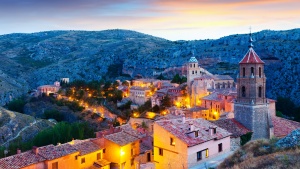Spain Uses Deceptive Signs to Deter British Tourists from Popular Beaches

Individuals living in Spain have had enough of British tourists and came up with a plan to discourage their presence.
Enraged Spanish locals are no longer tolerating British tourists appropriating their sandy domains. As a response, they’ve erected counterfeit notices cautioning seaside visitors about lurking jellyfish and potential rockfalls, all in an effort to discourage their presence.
Certain deceitful signs stationed proximate to Majorca’s shorelines display messages such as “exercise caution around hazardous jellyfish,” while others indicate perilous rock formations in the vicinity. One misleading placard even alleges a nearly three-hour trek to reach a beach, when in reality, it’s a mere 100 yards away.
The spurious posters frequently incorporate fine print inscribed in Catalan, a linguistic subtlety that exposes the lack of authenticity to those familiar with the language. One of these inscriptions clarifies:
“Beach accessible. Neither jellyfish nor foreigners permitted.” Another communicates: “Enter at your own risk. The danger isn’t a landslide; it’s excessive crowding.”
These fraudulent indicators are the brainchild of Caterva, a protest collective championing an anti-capitalist stance.
ADVERTISEMENT
Caterva avowed on social media: “These days we carried out a denunciation action against the #massificació tourist in the coves of #Manacor.”
“With a bit of humor, we’ve put up a few posters that you can see in the photos. From Cala Morlanda to Cala Bota.”
The collective elaborated:
“The usurpation of the coves is just another expression of how capitalism uses an economic activity like tourism, taken to the extreme, to dry the territory for free and to extract the maximum surplus value from the workers.”
Each year, in excess of 2.3 million British vacationers descend upon Majorca, with the mean guest expending £950 during their stay. Despite this influx, tourism administrators voice their exasperation with the mounting overpopulation.
Lucia Escribano, the tourism director, remarked to The Sun the prior year: “We are not interested in promoting the island in summer.
“We are limiting the number of beds on the island.
“We want quality not quantity.”
Caterva’s campaign against tourists monopolizing beach territories represents just one of several instances where disenchanted local populations are retaliating against British holidaymakers this season. In Greece, residents initiated a “Towel Movement” as a countermeasure against the “abusive encroachment” on their coastlines. Over in Spain’s Costa del Sol, a hotel employed a referee who would sound a whistle to signal the commencement of a sprint by beachgoers to secure spots.
Meanwhile, a TikTok video circulated featuring a holidaymaker on Tenerife who secured five sun loungers by dashing through the rows.
Recently, Caterva garnered attention for its critique of Spanish tennis luminary Rafael Nadal, who is a proprietor of both a restaurant and a tourism enterprise on the island. In a statement, Caterva asserted: “Capitalism uses tourism to the extreme to dry out the territory and extract the maximum surplus value from workers.
“There are culprits and it is necessary to name them, such as the hoteliers or the Rafael Nadals who are as complicit as the Balearic Government.”

